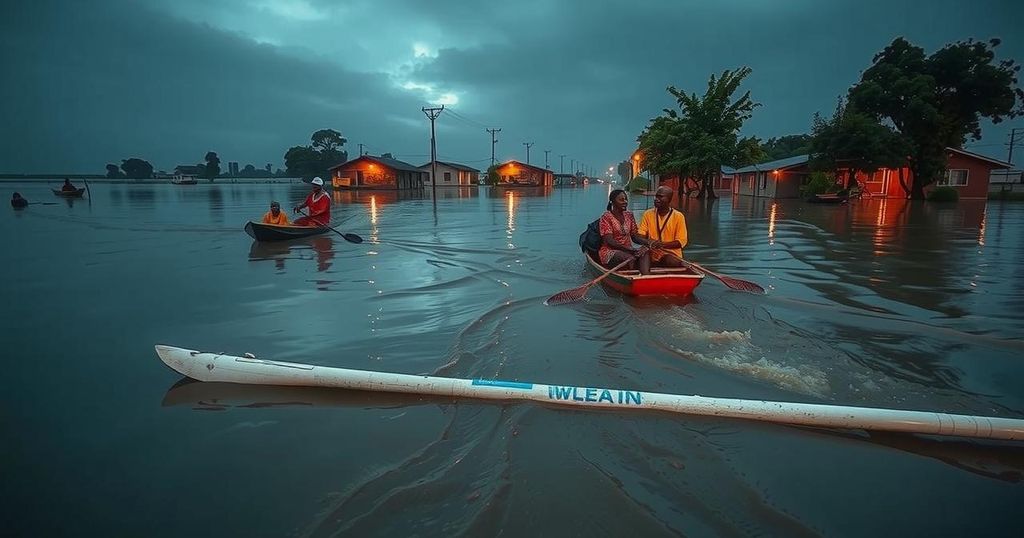Severe Flooding Heightens Health Crisis in South Sudan
South Sudan is facing unprecedented flooding that has displaced over 226,000 individuals and submerged numerous health facilities. With almost 800,000 refugees amidst rising health concerns like malaria and cholera, the WHO is responding by distributing emergency health kits and working to strengthen local healthcare responses. Climate change continues to heighten the severity of such crises, necessitating a focus on building resilient health systems to withstand future challenges.
Severe flooding in South Sudan has resulted in significant devastation, affecting over 226,000 individuals and displacing many from their homes. The current inundation has impacted 42 out of the country’s 78 counties, leading to the submersion of fifty-eight health facilities and rendering approximately ninety more inaccessible, with crucial roads cut off, including those connecting to the capital, Juba. As of October 4, 2024, around 890,000 people in the inundated regions are experiencing adverse effects. Although flooding is a recurrent issue during the rainy season from April to November, the intensity of these floods has escalated due to climate change, imposing additional challenges on communities already grappling with humanitarian crises. The country is currently hosting nearly 800,000 refugees from the armed conflict in neighboring Sudan, exacerbating the health crisis. Recent reports indicate a rise in malaria, with over 120,000 cases and suspected cholera cases detected in Renk County. Dr. Humphrey Karamagi from the World Health Organization (WHO) emphasized the heightened vulnerability of the population, asserting WHO’s commitment to ensuring access to essential health services amid growing humanitarian and health needs. In response, WHO has dispatched about 88 metric tons of emergency health kits to several critical locations, capable of treating over 870,000 individuals. These kits contain vital supplies, including emergency health kits, cholera treatment kits, antimalarial medicines, and snakebite antivenoms. WHO is also collaborating with the Ministry of Health to enhance its response to this escalating health emergency, conducting assessments and training health workers to fortify local healthcare initiatives. The organization is actively monitoring health consequences stemming from the floods and coordinating efforts to deliver emergency health assistance in the affected areas. Additionally, WHO is working across the African region to bolster climate-resilient health systems as climate change remains a persistent threat to human health.
The flooding in South Sudan is part of a broader humanitarian crisis exacerbated by climate change, poor infrastructure, and ongoing socio-political challenges. South Sudan has faced recurring floods that severely disrupt livelihoods, healthcare access, and overall well-being. The health facilities are crucial for managing diseases that are prevalent in such conditions, particularly vector-borne and waterborne diseases. As a region that has already faced significant displacement due to armed conflict, the recent floods have intensified the vulnerability of an already fragile population, making effective health interventions even more critical. The WHO’s ongoing work in South Sudan highlights the organization’s role in addressing health emergencies, emphasizing the need for climate-resilient strategies in healthcare systems to mitigate future health crises.
In summary, the severe flooding in South Sudan has compounded existing health crises, displacing thousands and overwhelming healthcare systems already beset with challenges. The WHO is working diligently to provide essential health services and supplies to the affected populations while advocating for long-term strategies to build resilient health systems in the face of climate change. Addressing the immediate health needs of the flood-affected communities is paramount, as is the development of sustainable practices to prepare for and mitigate future health impacts aligned with environmental changes.
Original Source: www.afro.who.int




Post Comment